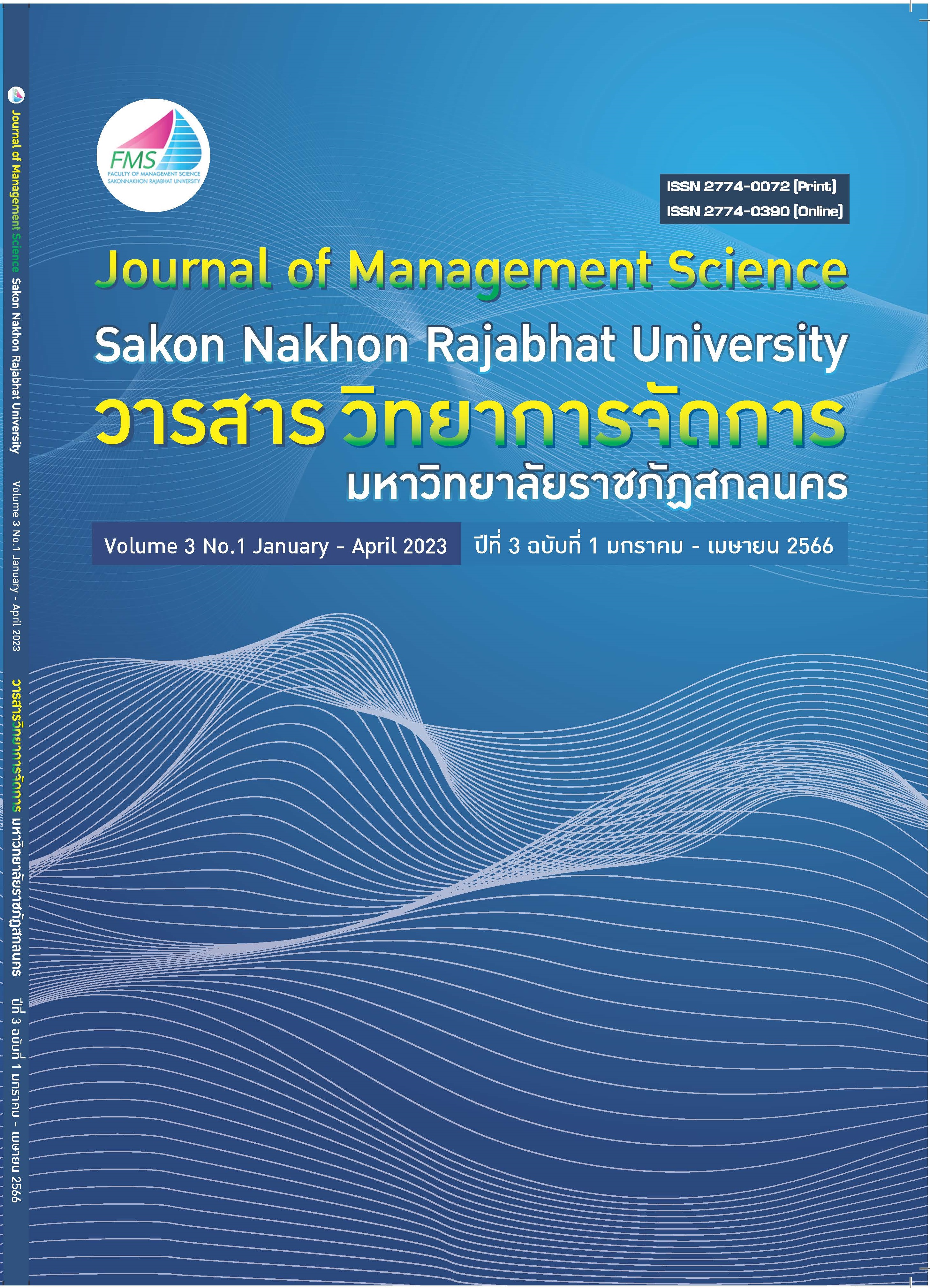Guidelines for developing leadership in the digital age of network school administrators Nong Wua so district is under Udon Thani district the primary education service area office 1
Keywords:
ภาวะผู้นำยุคดิจิทัล, ผู้บริหารโรงเรียน, ครูAbstract
ABSTRACT
The objectives of this research were; to study Leadership level in the digital age and development guidelines leadership in the digital age of network school administrators Nong Wua So District is under Udon Thani District the Primary Education Service Area Office 1 from 331 by questionnaires 5 level rating scale questionnaire with the reliability of 0.90 the statistics for data analysis were frequency percentage mean standard deviation and content Analysis.
The results of the study found that:
- Leadership level in the digital age of school administrators.The overall is a high level. The side with the highest mean was visionary leadership followed by
digital citizenship and excellence in professional practice the side with the least mean is digital age learning culture.
- 2. Guidelines for developing leadership in the digital age of network school administrators Nong Wua So Sort the frequencies in descending order namelyEducational administrators should develop themselves to be competent in using technology. Should practice using technology to communicate via online media in various channels. to familiarize teachers with the use of basic technology. Should focus on teachers and personnel to see the importance and benefits of technology. Engage in the use of technology to communicate and working together through technological equipment that is suitable and up-to-date with the situation.
Keywords : Academic leadership, Administrators,Teacher
References
กัลยวรรธน์ ตะเภาทอง. (2564). แนวทางการพัฒนาภาวะผู้นำเชิงเทคโนโลยีของผู้บริหารโรงเรียนขยายโอกาส สังกัดสำนักงานเขตพื้นที่การศึกษาประถมศึกษาพิจิตร เขต 1. วิทยานิพนธ์ ศษ.ม. พิษณุโลก: มหาวิทยาลัยนเรศวร.
เจษฎา ชวนะไพศาล. (2563). แนวทางการพัฒนาภาวะผู้นำเชิงเทคโนโลยีของผู้บริหารสถานศึกษากลุ่ม สหวิทยาเขตทวารวดีสังกัด สำนักงานเขตพื้นที่การศึกษามัธยมศึกษาสุพรรณบุรี. วิทยานิพนธ์ ศษ.ม. สุพรรณบุรี: มหาวิทยาลัยศิลปากร.
จันทนา แสนสุข. (2559). ภาวะผู้นำ Leadership. พิมพ์ครั้งที่ 3. กรุงเทพฯ: บริษัท ทริปเพิ้ล กรุ๊ป จำกัด.
จิณณวัตร ปะโคทัง. (2561). ภาวะผู้นำยุคดิจิทัลสำหรับผู้บริหารสถานศึกษามืออาชีพ. อุบลราชธานี: มหาวิทยาลัยราชภัฏอุบลราชธานี.
ชัญญาภัค ใยดี. (2561). การศึกษาแนวทางการพัฒนาภาวะผู้นำด้านเทคโนโลยีของผู้บริหารสถานศึกษา สังกัดองค์การบริหารส่วนจังหวัดนครราชสีมา. วารสารดุษฎีบัณฑิตทางสังคมศาสตร์, 8(1), 150-164.
ณัฎฐณิชา พรปทุมชัยกิจ. (2564). ภาวะผู้นำยุคดิจิทัลของผู้บริหารสถานศึกษา สังกัดสำนักงานเขตพื้นที่การศึกษามัธยมศึกษา ศรีสะเกษ ยโสธร. สารนิพนธ์ ศม.ษ. ศรีสะเกษ: มหาวิทยาลัยราชภัฎศรีสะเกษ.
บุญชม ศรีสะอาด. (2554). การวิจัยเบื้องต้น. พิมพ์ครั้งที่ 7. กรุงเทพฯ: สุวีริยาสาส์น.
สำนักงานเขตพื้นที่การศึกษาประถมศึกษาอุดรธานี เขต 1. (2564). แผนปฎิบัติการประจำปี 2564. อุดรธานี: กลุ่มบริหารงานบุคคล สพม.สกลนคร.
สำนักงานคณะกรรมการการศึกษาขั้นพื้นฐาน. (2562) “นโยบายสำนักงานคณะกรรมการการศึกษา ขั้นพื้นฐานปีงบประมาณ พ.ศ. 2562. สืบค้นวันที่ 6 สิงหาคม 2562. เข้าถึงได้จาก https://www.obec.go.th.
สุกัญญา แช่มช้อย. (2561). การบริหารสถานศึกษาในยุคดิจิทัล. กรุงเทพฯ: สำนักพิมพ์แห่งจุฬาลงกรณ์มหาวิทยาลัย.
สุรีรัตน์ รอดพ้น. (2564). การศึกษาภาวะผู้นำดิจิทัลของผู้บริหารโรงเรียนประชารัฐ สังกัดสำนักงานเขตพื้นที่การศึกษาประถมศึกษาศรีสะเกษ เขต 1. ศึกษาค้นคว้าด้วยตนเอง ศษ.ม. อุบลราชธานี: มหาวิทยาลัยราชภัฎอุบลราชธานี.
เอกชัย กี่สุขพันธ์. (2559). การบริหารสถานศึกษายุคดิจิทัล. สืบค้นวันที่ 2 พฤษภาคม 2564. เข้าถึงได้จาก http://www.trueplookpanya.com/knowledge/content/52232/-edu-t2s1-t2-t2s3-.
_______. (2562). “การบริหารสถานศึกษายุคดิจิทัล”. สืบค้นวันที่ 2 พฤษภาคม 2562. เข้าถึงได้จาก http://www.trueplookpanya.com.
International Society for Technology in Education (ISTE). (2009). National Educational Technology Standard for Administrators. Retrieves form https://id.iste.org/docs/pdfs/20-4_ISTE_Standards-A_PDF.pdf. (15 May 2019).
Downloads
Published
How to Cite
Issue
Section
License
Copyright (c) 2023 JOURNAL OF MANAGEMENT SCIENCE SAKON NAKHON RAJABHAT UNIVERSITY

This work is licensed under a Creative Commons Attribution-NonCommercial-NoDerivatives 4.0 International License.
An article published in the Journal of Management Science. Sakon Nakhon Rajabhat University is the opinion, copyright and responsibility of the author of the work.







